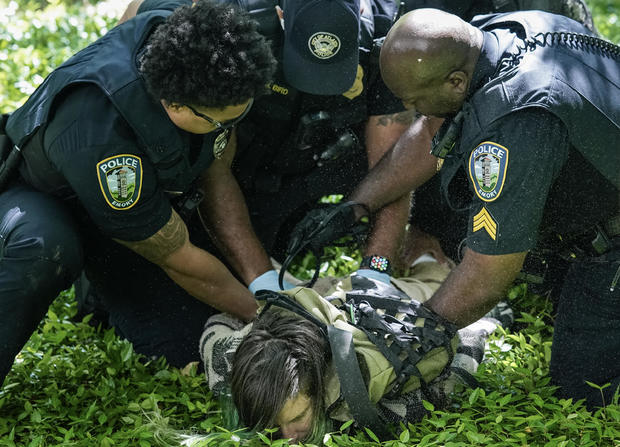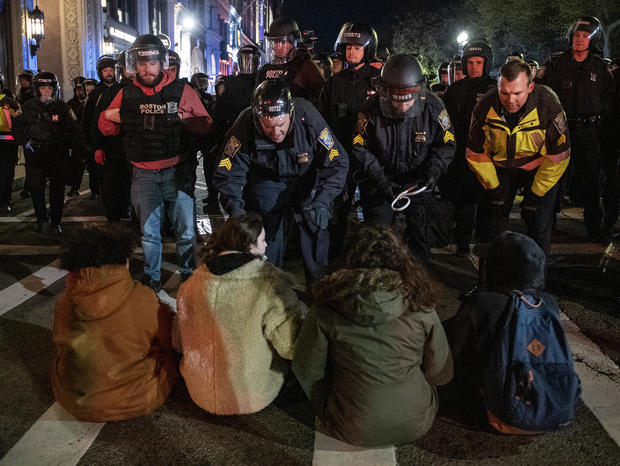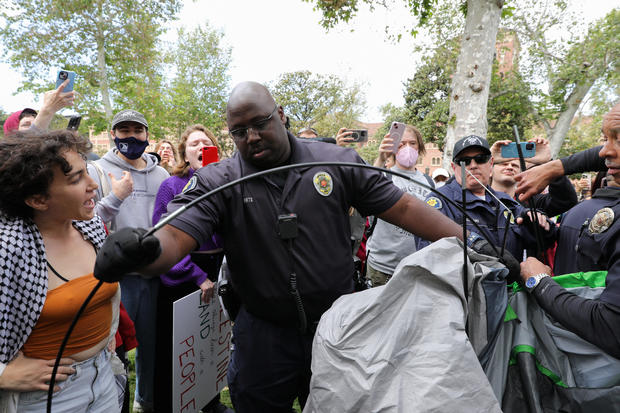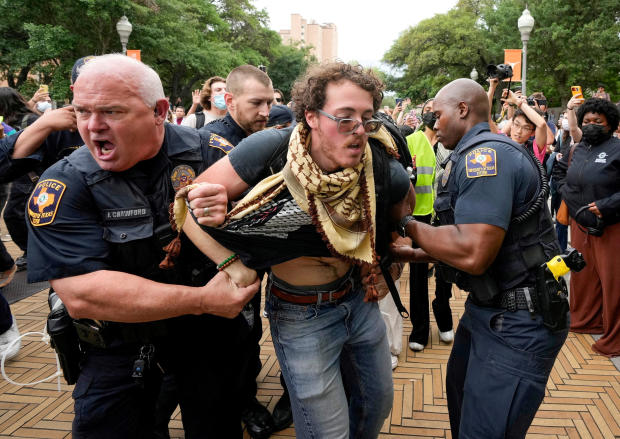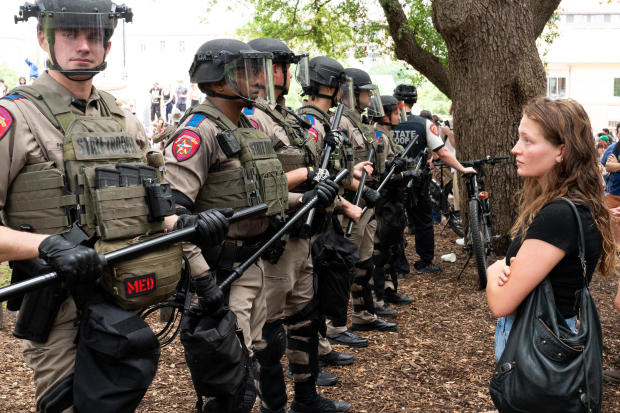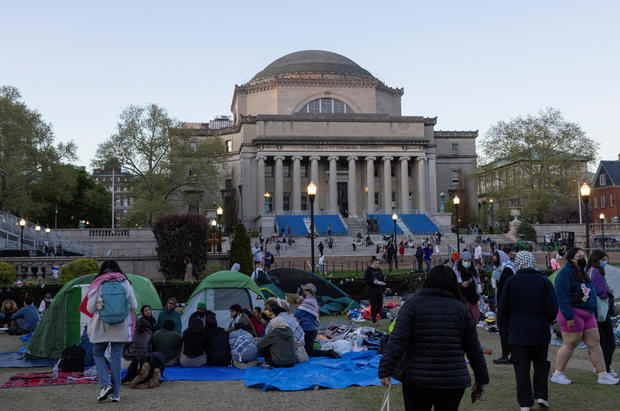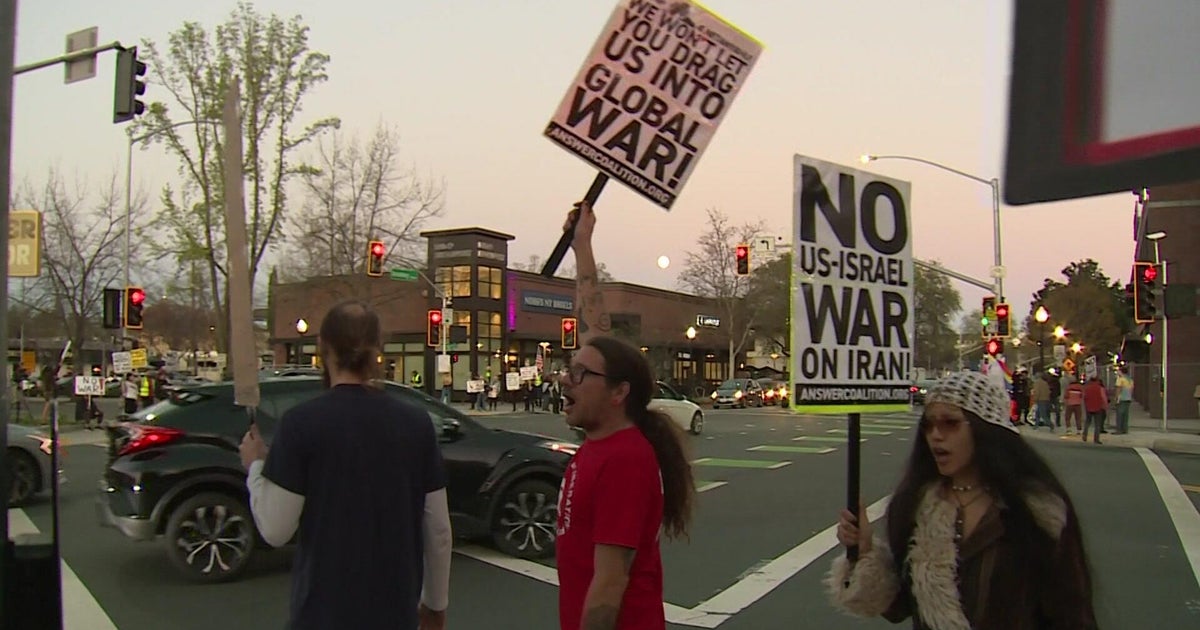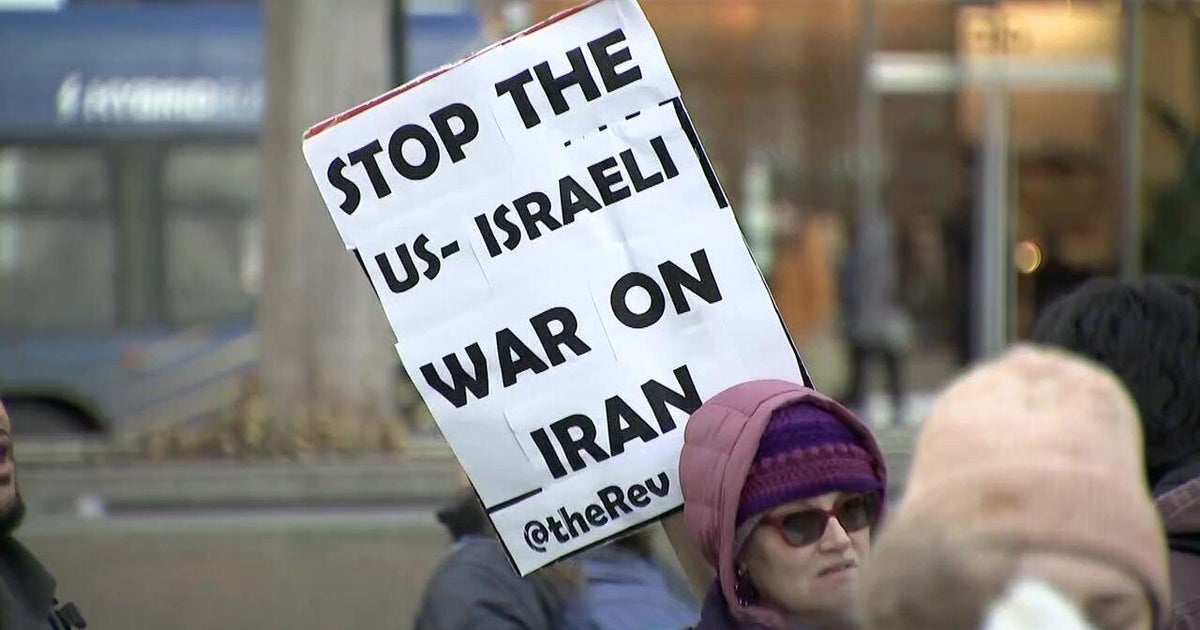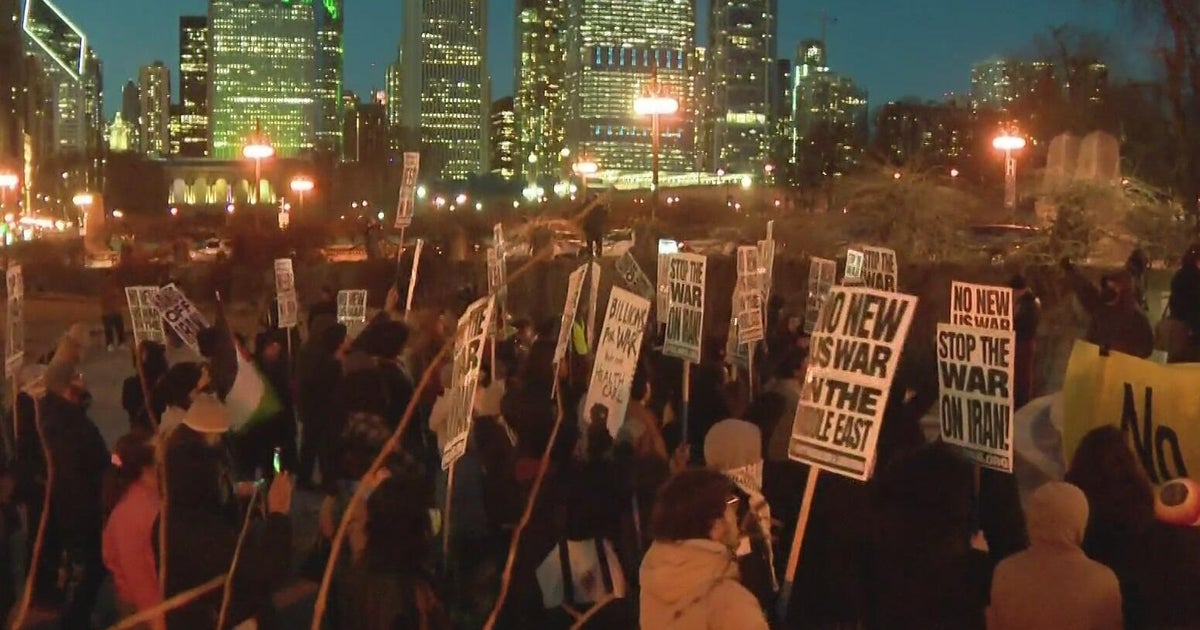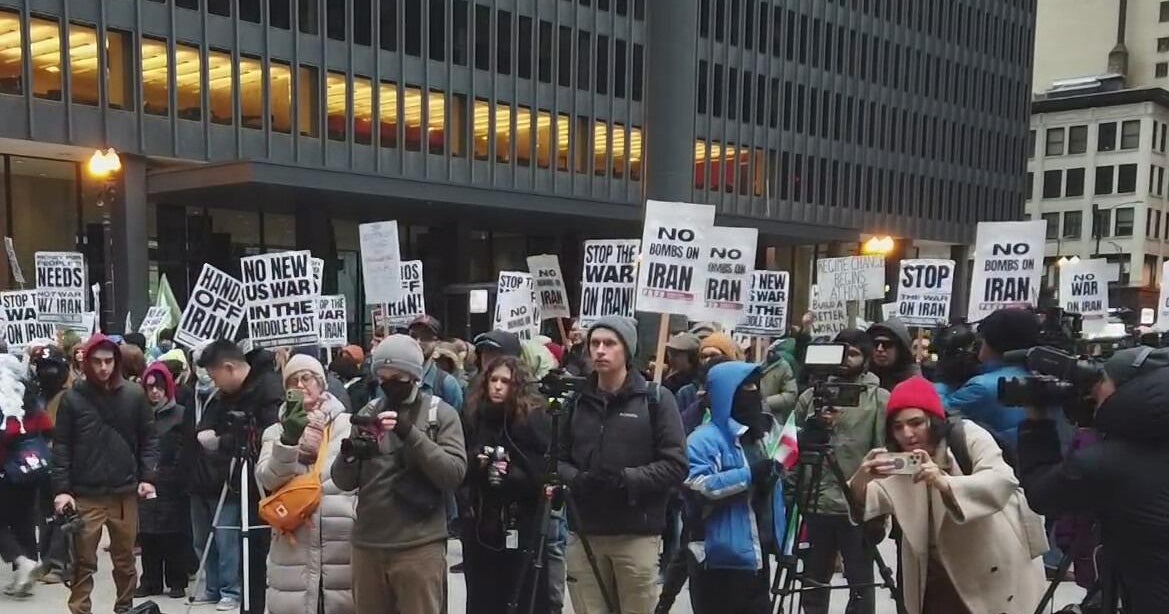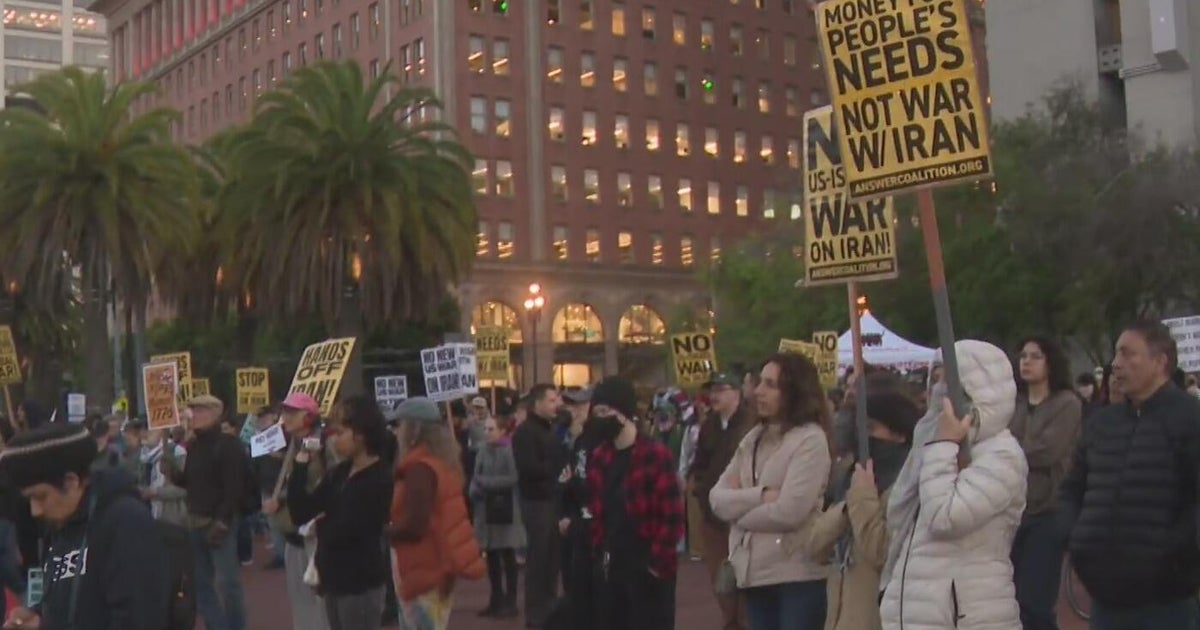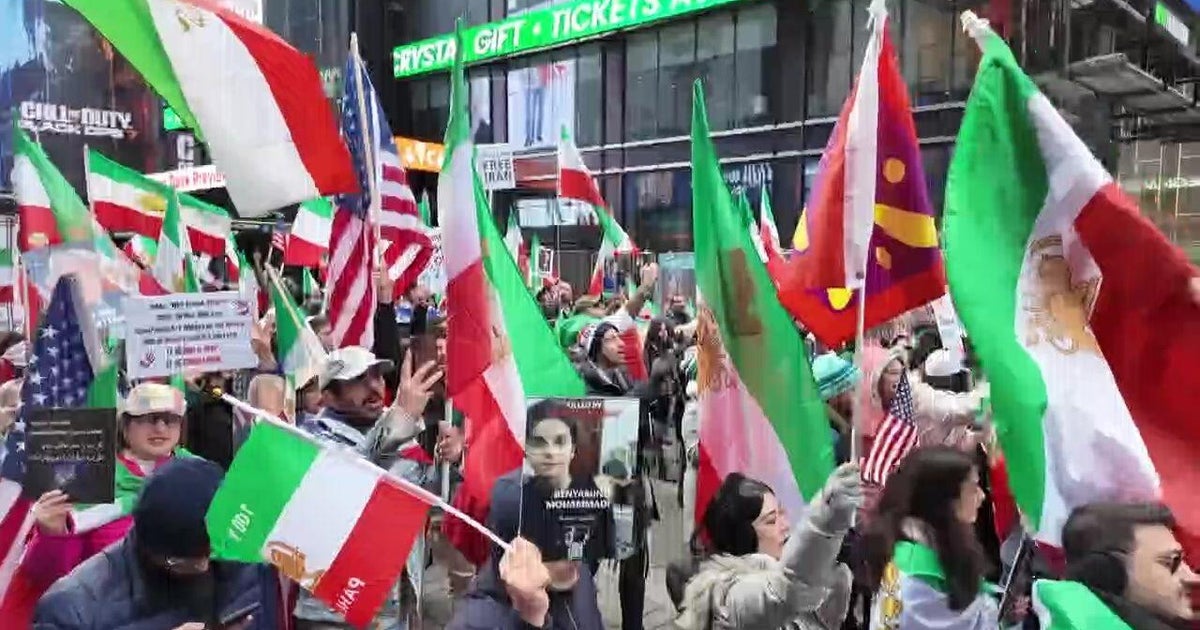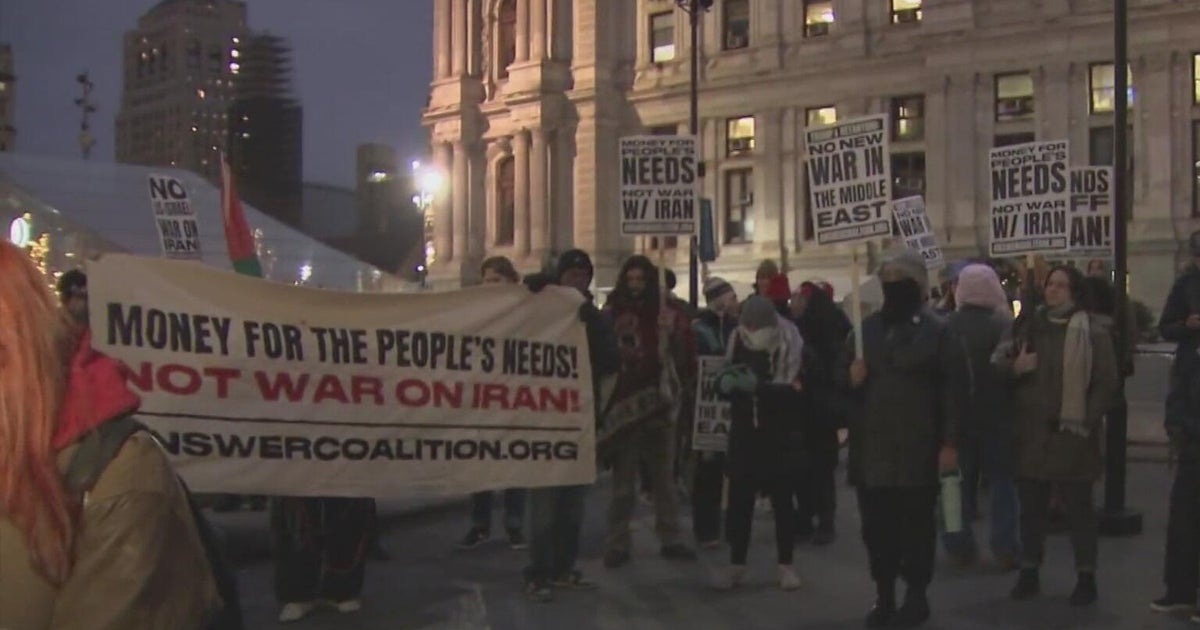University protests over Israel-Hamas war in Gaza lead to hundreds of arrests on college campuses
Police broke up a demonstration against Israel's war against Hamas in Gaza on Thursday at Emory University in Atlanta, the latest flashpoint in a growing movement on college campuses around the country. Hundreds of people have been arrested in California, Massachusetts, Texas and other states during the tense protests, following several rounds of arrests in New York in recent days.
Several dozen protesters set up tents in an encampment on Emory's quad early Thursday morning, Assistant Vice President Laura Diamond said in a statement. The initial group of protesters wasn't associated with the university, but they were later joined by some members of the Emory community, Diamond said.
Protesters chanted slogans supporting Palestinians and opposing a public safety training center being built in Atlanta.
The school's police department told the group they were trespassing, and police took around two dozen people into custody and cleared the quad when they refused to leave, Diamond said. Some officers carried semiautomatic weapons, and video showed officers using a stun gun on one protester who they had pinned to the ground.
The Georgia State Police confirmed later Thursday that officers used a Taser on one protester who they said was resisting arrest. The protester was tased twice before he was taken into custody, according to Courtney Lund, a public information officer for the state police.
The Emory and Atlanta police departments requested assistance from state law enforcement authorities after being met by university protesters who threw bottles and refused to leave, Lund said.
The university police called city and state authorities after deciding that the initial group of protesters were not affiliated with Emory University based on their refusal to confirm their connections, Cheryl Elliott, the university's Vice President for Public Safety, said in a statement Thursday evening, adding that the individual who was tased also "is not a member of the Emory community."
"Due to the direct assault of officers, law enforcement released chemical irritants into the ground to assist with crowd control," Elliot said.
At 7:41 a.m. a few dozen protestors arrived on campus. When they arrived, these individuals ignored and pushed past EPD officers stationed on the Quad and set up tents in an area where equipment and materials were staged for Commencement. Based on their actions and refusal to confirm their connection to Emory, EPD made the assessment that these individuals were not Emory community members.
At Emerson College in Boston, chaos erupted overnight as police tried to break up a pro-Palestinian alleyway camp. Police said Thursday 108 people were arrested and four police officers suffered injuries that were not life-threatening.
Video shows police first warning students in the alleyway to leave. Students link arms to resist officers, who move forcefully through the crowd and throw some protesters to the ground.
"As the night progressed, it got tenser and tenser. There were just more cops on all sides. It felt like we were being slowly pushed in and crushed," said Ocean Muir, a sophomore at Emerson.
"For me, the scariest moment was holding these umbrellas out in case we were tear-gassed, and hearing them come, and hearing their boots on the ground, just pounding into the ground louder than we could chant, and not being able to see a single person," she said.
Muir said police lifted her by her arms and legs and carried her away. Along with other students, Muir was charged Thursday with trespassing and disorderly conduct.
Emerson College leaders had earlier warned students that the alley has a public right-of-way and city authorities had threatened to take action if the protesters didn't leave. Emerson canceled classes Thursday.
In nearby Cambridge, Harvard University had sought to stay ahead of protests this week by limiting access to Harvard Yard and requiring permission for tents and tables. That didn't stop protesters from setting up a camp with 14 tents Wednesday following a rally against the university's suspension of the Harvard Undergraduate Palestine Solidarity Committee.
Harvard law student Tala Alfoqaha, who is Palestinian, said she and other protesters want more transparency from the university.
"My hope is that the Harvard administration listens to what its students have been asking for all year, which is divestment, disclosure and dropping any sort of charges against students," she said.
In Philadelphia, more than 100 students at Temple University walked out of class and marched from campus to City Hall, CBS Philadelphia reported. The protesters were also joined by students from Drexel University.
George Washington University in the nation's capital on Thursday evening called anti-war encampments "an unauthorized use of university space" and said they were in violation of several university policies.
Indiana University's police department similarly said a gathering of tents at Dunn Meadow was in violation of the university's policies and that 33 people were arrested after refusing to take them down.
Students protesting the Israel-Hamas war are demanding schools cut financial ties to Israel and divest from companies enabling its monthslong conflict. Some Jewish students say the protests have veered into antisemitism and made them afraid to set foot on campus as graduation nears, partly prompting a heavier hand from universities.
USC
Another 93 people were arrested Wednesday night during a protest at the University of Southern California and accused of trespassing, the Los Angeles Police Department said. There were no reports of injuries.
Tensions were already high at USC after the university canceled a planned commencement speech by the school's pro-Palestinian valedictorian, citing safety concerns. On Thursday, the university canceled its main-stage commencement ceremony, which is attended by as many as 65,000 people, because of the amount of time needed to process the crowd in line with new safety measures, USC said. Individual school ceremonies would still be held.
After scuffles with police early Wednesday, a few dozen demonstrators standing in a circle with locked arms were detained one by one without incident later in the evening.
Officers encircled the dwindling group sitting in defiance of an earlier warning to disperse or be arrested. Beyond the police line, hundreds of onlookers watched as helicopters buzzed overhead. The school closed the campus.
"Both sides of my family were displaced from Palestine, and I'm here using my voice because my grandparents couldn't," protester Randa Sweiss told CBS Los Angeles.
In Northern California, students at California State Polytechnic University, Humboldt, barricaded inside a building for a third day, and the school shut down campus through the weekend and made classes virtual.
UT Austin
At the University of Texas at Austin, hundreds of local and state police — including some on horseback and holding batons — moved against protesters Wednesday, at one point sending some tumbling into the street. Officers pushed their way into the crowd and made arrests at the behest of the university and Texas Gov. Greg Abbott, according to the state Department of Public Safety.
A photographer covering the demonstration for Fox 7 Austin was in the push-and-pull when an officer yanked him backward to the ground, video shows. The station confirmed that the photographer was arrested. A longtime Texas journalist was knocked down in the mayhem and could be seen bleeding before police helped him to emergency medical staff.
Dane Urquhart, a third-year Texas student, called the police presence and arrests an "overreaction," adding that the protest "would have stayed peaceful" if the officers had not turned out in force.
"Because of all the arrests, I think a lot more (demonstrations) are going to happen," Urquhart said.
Police left after hours of efforts to control the crowd, and about 300 demonstrators moved back in to sit on the grass and chant under the school's iconic clock tower.
In a statement Wednesday night, the university's president, Jay Hartzell, said: "Our rules matter, and they will be enforced. Our University will not be occupied."
On Thursday, university spokesperson Brian Davis said not everyone at the protests were students. "There was significant participation by outside groups present on our campus yesterday," Davis said in a statement. He said 26 of the 55 people arrested were unaffiliated with the university.
The Travis County Attorney's Office, which prosecutes misdemeanor crimes, dropped 46 cases stemming from Wednesday's protests after finding deficiencies in the probable cause affidavits, a spokesperson said in a statement.
Columbia University
While grappling with growing protests from coast to coast, schools have the added pressure of approaching May commencement ceremonies. At Columbia University in New York, students defiantly erected an encampment where many are set to graduate in front of families in just a few weeks.
Columbia continued to negotiate with students after several failed attempts to clear the encampment and over 100 arrests in recent days.
The university averted another confrontation between students and police Wednesday. University President Minouche Shafik had set on Tuesday a midnight deadline to reach an agreement on clearing an encampment, but the school extended negotiations for another 48 hours.
Late Thursday night, the school said, "The talks have shown progress and are continuing as planned. ... We have our demands; they have theirs. A formal process is underway and continues. There is a rumor that the NYPD has been invited to campus this evening. This rumor is false."
Nevertheless, two police buses were parked nearby and there was a noticeable presence of private security and police at entrances to the campus.
Just past midnight, a group of some three dozen pro-Palestinian protestors handed out signs and started chanting outside of the locked Columbia University gates. They then marched away as at least 40 police officers assembled nearby.
A group of Columbia University students filed a federal civil rights complaint against the school Thursday, accusing it of discriminating against Palestinian students and pro-Palestinian protesters, CBS New York reports.
On a visit to campus Wednesday, U.S. House Speaker Mike Johnson, a Republican, called on Shafik to resign "if she cannot immediately bring order to this chaos."
He claimed the university is being taken over by a radical and extreme ideology, citing several recent incidents of antisemitic language by protesters on and off campus.
"We need the National Guard, law enforcement or someone to come in here and take control," Johnson told CBS News correspondent Nancy Chen. "Desperate times call for desperate measures."
New York Gov. Kathy Hochul accused Johnson of politicizing the protest by coming to campus and said she has no plans to call in the National Guard for now.
Senate Minority Leader Mitch McConnell took a measured approach Thursday on how to handle the demonstrations, telling CBS News he'd wait to see if university presidents "can get control of the situation" before taking more forceful measures.
On Wednesday evening, a Columbia spokesperson said rumors that the university had threatened to bring in the National Guard were unfounded. "Our focus is to restore order, and if we can get there through dialogue, we will," said Ben Chang, Columbia's vice president for communications.
Democratic Rep. Ilhan Omar of Minnesota, whose daughter was involved in the protests, visited the protesters on Thursday.
"I had the honor of seeing the Columbia University anti-war encampment firsthand," Omar wrote on social media. "Contrary to right-wing attacks, these students are joyfully protesting for peace and an end to the genocide taking place in Gaza. I'm in awe of their bravery and courage."
Columbia graduate student Omer Lubaton Granot, who put up pictures of Israeli hostages near the encampment, said he wanted to remind people that there were more than 100 hostages still being held by Hamas.
"I see all the people behind me advocating for human rights," he said. "I don't think they have one word to say about the fact that people their age, that were kidnapped from their homes or from a music festival in Israel, are held by a terror organization."
On Wednesday about 60 tents remained at the Columbia encampment, which appeared calm. Security remained tight around campus, with identification required and police setting up metal barricades.
Columbia said it had reached an agreement with protest representatives that only students would remain at the encampment, and that the protesters "have taken steps to make the encampment welcome to all and have prohibited discriminatory or harassing language."
Elsewhere in Manhattan, at New York University this week, police said 133 protesters were taken into custody.
At the City College of New York on Thursday, hundreds of students who were gathered on the lawn beneath the Harlem campus' famed gothic buildings erupted in cheers after a small contingent of police officers retreated from the scene. In one corner of the quad, a "security training" was held among students.
And on Monday, more than 40 protesters were arrested at an encampment at Yale University in Hew Haven, Connecticut, and charged with criminal trespass, a misdemeanor.
Ohio State
The school issued a statement Thursday night saying, "Well established university rules prohibit camping and overnight events. Demonstrators exercised their first amendment rights for several hours and were then instructed to disperse. Individuals who refused to leave after multiple warnings were arrested and charged with criminal trespass."
The Columbus Dispatch put the number at over a dozen and said the demonstration lasted about six hours.
